You’re trying to keep up with the demands of growing your unborn child, when a toothache starts to creep in… tooth pain is one of those discomforts that happens to be categorized by many people(pregnant or not) as purely unbearable.
Toothaches while pregnant are not so fun when you don’t have someone the size of a cantaloupe pressing against your air breathers all day long.
When this comes about you may just want to throw it all in the can, give up on trying to keep up with everything, and submit to laying in bed and holding your mouth.
Depending on where your tooth pain is located, how severe it is, and how high your personal pain tolerance is will largely determine when you need to do something to help ease the pain.
Toothaches are deceptive little monsters. One minute they truly aren’t that bad then the next they have you doubling over in pain you have to moan through.
First, figure out where your pain is located if it’s in one specific tooth or all over
There are several sensations and causes that come along with a toothache, and it can change frequently or over time. Tooth pain can come on seemingly out of nowhere and be; sharp, a dull ache, constant throbbing, or even consist of a burning sensation.
The gum around the affected tooth/teeth can also become inflamed, and in worse case scenarios form an abscess(a pocket of pus).
The moment that tooth pain rains on your pregnancy parade – it’s very important to take care of it, and pay attention to why it’s happening in the first place.
There are several causes of tooth pain during pregnancy and some are a part of hormone production
You might blame yourself for not brushing well over the last few months, I mean… being pregnant does mean being extra tired at night, you might have skipped a few too many brushes.
But, hold it right there, skipping a few brushes might not be the reason you have tooth pain. Let’s go over the various reasons that tooth pain happens.
Hormones are rampant during pregnancy wreaking havoc on mouth and gum health
Many women find that they are more prone to cavities and tooth decay during pregnancy – toothaches come along with hormone production. Some women don’t get more cavities but find that their teeth become extremely sensitive during pregnancy.
View in gallery
The cause of this is due to the hormones estrogen and progesterone that your body is now making – these hormones are responsible for excess blood flow and dilated blood vessels within the gums and teeth.
Having increased blood flow to the gums allows for extra sensitive teeth in general, and even more sensitive to plaque build-up in the area.
During pregnancy, the bodies plaque fighting abilities fluctuate
It’s not only an increase in blood flow to your teeth and gums that causes the area your teeth live in to become more sensitive, but the body’s natural abilities to decrease plaque build-up completely changes.
The natural plaque removing abilities your mouth has outside of pregnancy can significantly slow down at times.
Your mouth’s ecosystem might be going through a rough patch of its ability to remove plaque naturally and the extra plaque buildup could now be causing significant tooth pain.
As the plaque continues to build up during these altered plaque removal cycles, if the plaque reaches a hardened tarter state, this is when the tooth pain and sensitivity will peak.
When tarter begins to build up, the teeth are now at an increased risk for cavity and decay. Unfortunately, during pregnancy, we aren’t aware that plaque removal has been diminished, so it is often caught when tooth pain is already prevalent.
How to improve your bodies natural plaque fighting abilities during pregnancy
When you aim to improve your body’s natural plaque fighting it’s called remineralizing your enamel. When enamel has weakened due to dietary acids or hormones, it has lost much of its mineral content.
The best way to remineralize your enamel naturally is to help your salivatory glands to produce more saliva.
That way the calcium in your saliva will bond to your enamel. Thus, if your teeth are continuously being remineralized from your saliva, you are less likely to have toothaches.
View in gallery
Remineralize your teeth naturally by eating more probiotics, less dairy, and more
To remineralize your teeth you have to figure out what is contributing to de-mineralizing your teeth.
Your diet and lifestyle regimens, possibly contain foods and habits that help or don’t help create an ideal space for remineralization, let’s take a look into what those things are.
The following methods have been found helpful to remineralizing teeth:
Chewing sugarless gum help promote mineralization
The way that gum makes you salivate is enough to tell you that it can be helpful in remineralizing your teeth. That is if it’s sugarless gum because sugar does not help strengthen the enamel on your teeth.
Chewing on a gum that contains little to no sugar can be beneficial for growing back your enamel because it makes your saliva glands produce more saliva, thus bringing calcium to your teeth.
Opt to chew gum after and in between your meals, this will provide the most optimal time frame for remineralization to occur because your glands will have more time to produce saliva.
Gum will also provide a protective layer on the enamel of your teeth, xylitol as an ingredient is one of the safest versions of sugar-free gum as well as sorbitol as they seem to be ingredients that act by starving off the harmful bacteria that contribute to plaque and decay.
Licorice root is a fantastic natural remedy to remineralizing your teeth
The Chinese Licorice Plant is an amazing tool in combating the bacteria that attribute plaque and decay – the plant is naturally high in the beneficial compound called glycyrrhizin that does the work.
Licorice root is easy to come by, most natural grocers carry it, and is simple to use. Buying a bag of licorice root lollipops is one way to satisfy your sweet tooth and combat dental ailments in one. You might not know it yet, but your ancestors were using licorice root hundreds of years ago to promote oral care.
They understood that chewing on licorice root would promote whiter teeth and prevent cavities – it even prevents sore gums too.
View in gallery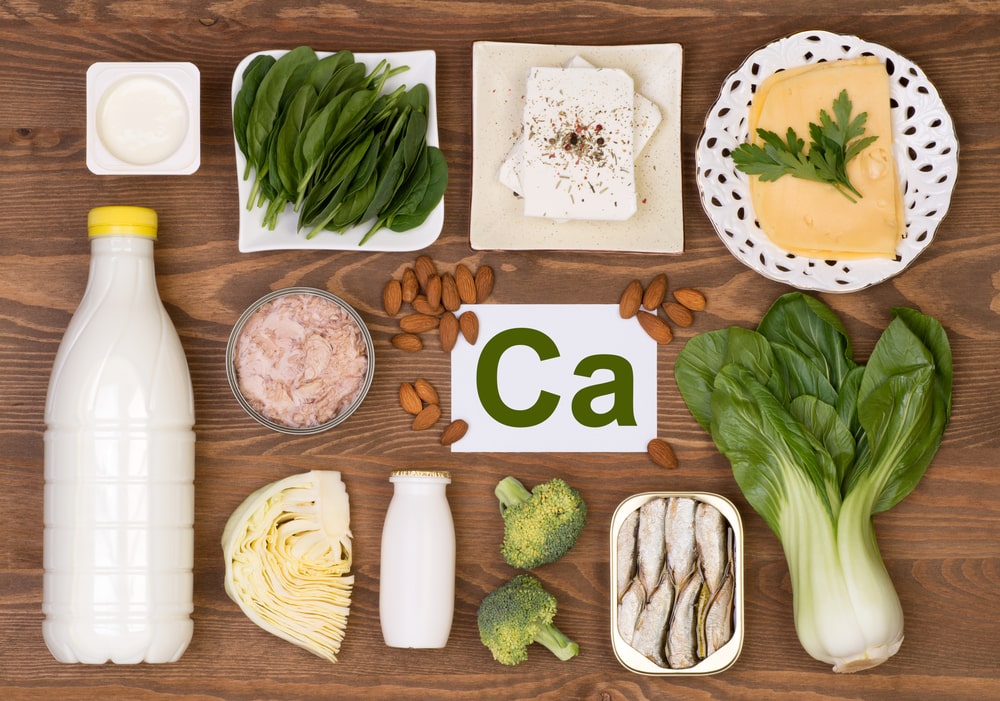
Adding calcium and other beneficial vitamins to your diet can help promote oral health
You can easily implement vitamins into your diet through supplements or the foods you consume to promote good oral health as a whole.
Phosphorus is the stepping stone for calcium and helps the teeth absorb calcium
Most people will get enough phosphorus in their diet naturally, given that you’re eating enough meat, eggs, fish, and whole grains. Phosphorus sets the stage for your enamel to absorb calcium in the first place, you need phosphorus to implement more calcium into your body.
Consuming a well-balanced diet is enough to get enough phosphorus in your day-to-day life.
Vitamin D is a hormone your body creates within itself which can help promote optimal oral health
Vitamin D is easy to come by, your body actually produces it naturally from sunlight – though it’s rather difficult to produce the proper amount your body needs in quantities large enough to keep your internal stores at a decent level.
That makes it more common for people to be deficient in vitamin D than it is for someone to have the right levels in their system. It’s easy to supplement vitamin D, you can get it in capsule form or in liquid form(which absorbs more quickly).
The best part about vitamin D is that you can’t really take too much of it, you can supplement vitamin D right at home starting today. Studies done have shown that teeth are better protected from cavities with the help of vitamin D.
Probiotics are another natural way of promoting good oral health during pregnancy
Your gums, teeth, and entire mouth are covered in bacteria – beneficial or not – this bacteria is one of the biggest culprits of cavities and gum disease. Probiotics are sold specifically for oral health, there are a specific set of probiotic strains present in the mouth.
Aim to get the strain of probiotics known to be found beneficial for the mouth such as; Lactobacillus, streptococcus, rhamnosus, ligilactobacillus salivarius, and lactobacillus rhamnosus.
These strains are found to colonize first and foremost in the mouth – when you provide your body with probiotics of these strains you provide a stable ground for good oral health.
Calcium needs to be sufficient in pregnancy to have strong teeth that do not decay over time
As we all know, our teeth are an extension of our bones – your bones need calcium to remain healthy.
View in gallery
You can easily begin adding calcium into your diet through supplements during pregnancy.
During the second half of your pregnancy is especially beneficial since it helps reduce pre-eclampsia and other ailments that prevail in the 2nd and 3rd semesters of pregnancy.
Speak with your Obstetrician before you begin supplementing calcium or any vitamin for that matter. Calcium is the key to having successful strong contractions as well.
Calcium citrate is what your OB is most likely to prescribe if you are showing signs of bone density loss through your teeth or even high blood pressure at the end of pregnancy.
Vitamin C seems so simple to include in your diet except many pregnant women are actually deficient in this vitamin
The connective tissues in your gums will thank you for including vitamin C in your supplements during pregnancy – and if you’re reading this because you’re already experiencing poor teeth health – now is a great time to supplement it into your diet.
The connective tissue in your gums is the backbone and support system for your teeth, if your foundation is weak just imagine how the rest of your oral health will play out. Some women experience their first cavity, having a tooth pulled, or bleeding gums when pregnancy hormones hit.
You may be able to stop bleeding gums from continuing or prevent cavities from developing by ensuring you get enough vitamin C in your diet. vitamin C is incredibly easy to come by too, so there’s really no excuse to not include it in your dietary intake.
Supplementation of vitamin C is an option or you can plan to cook a lot of sweet potatoes, eat fruits and veggies that are rich in Vitamin C such as mango, papaya, oranges, watermelon, kale, the full scope of berries, and so much more.
Pretty much any and all fruits and vegetables contain vitamin C.
Vitamin A can help during pregnancy when having poor oral health
View in gallery
There are so many benefits to supplementing vitamin A during pregnancy, that’s why I called it a pregnant lady’s best friend.
Think beautiful eyes, skin, hair, nails, and mouth. All thing’s you visibly see and want to look better when you look in the mirror will benefit from vitamin A.
Vitamin A is like the super-vitamin during pregnancy, it will even help you produce more saliva and you know what more saliva means, right?
More saliva production means that you will naturally have more calcium in your mouth through saliva production, AKA, stronger gums, less potential for cavities, and bacteria that naturally clean your mouth… say what?
Okay, so now that you’re on board with bringing vitamin A into your diet, let’s discuss where to find it in the food chain.
Maybe you can even start right now? Anything orange, well, most things orange will include vitamin A like carrots, sweet potatoes, bell peppers, and more.
If you love to enjoy animal products you’re in for a treat, you can find a ton of vitamin A in meat, fish, and poultry.
Meat, cream cheese, yogurt, fortified milk, kidney, cod, liver, kidney, and so much more can be included in your diet to add vitamin A.
Including vitamins safely during pregnancy for optimal oral health is important
Always be sure to ask your health care provider who knows you’re pregnant how you should supplement any and all vitamins in the right dosages for you and your baby.
A good rule of thumb is to aim to source all of your vitamins from your diet first and foremost, thus supplementing what seems out of reach and needs an extra boost.
It’s easy to fall below the average level of vitamin stores during pregnancy – your body is already working hard enough to keep up with your body – that’s why it’s so important to include prenatal vitamins and supplements as needed.
Some vitamins can be supplemented in small amounts and other’s can be potentially harmful to your baby
While supplementing vitamins can be a great way to boost overall oral health during pregnancy to prevent toothaches in the first place.
It’s extremely important to take the right dosages if at all – speaking with your healthcare provider can ensure that you don’t take too much of any given vitamin during pregnancy.
Most of the time prenatal are enough to get in your daily dosages of vitamins
Be sure to check which vitamins your prenatal (if taking one) has listed in it – you might find that it already includes many of these vitamins. Prenatals are vitamins designed specifically for pregnancy, making it simple and safe to get your vitamins in daily.
View in gallery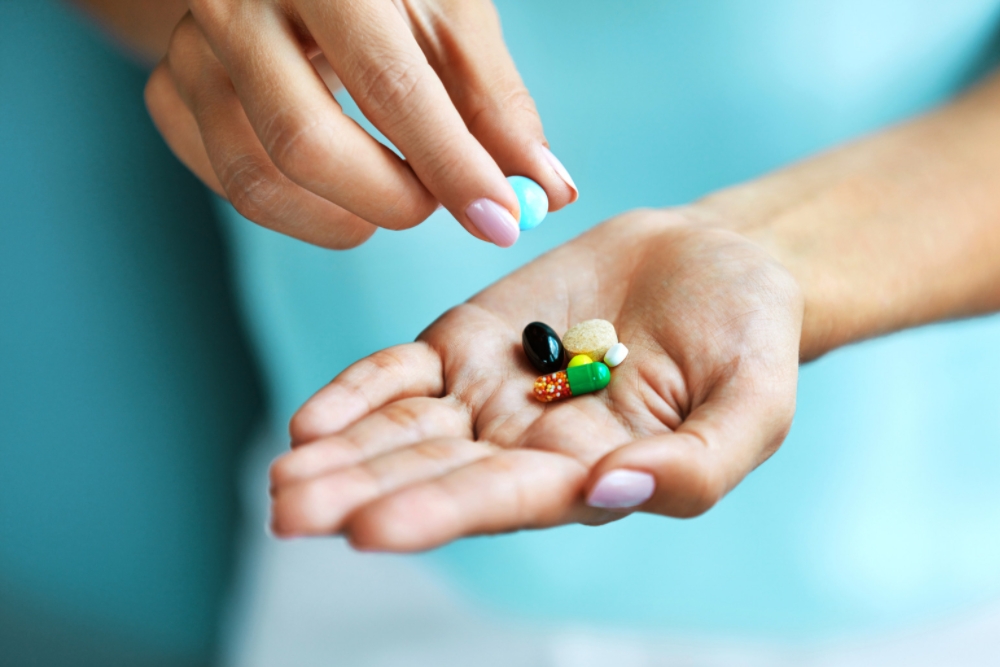
Vitamin A should be taken only with a medical recommendation from your OB during pregnancy
Out of all of the vitamins listed here for tooth health during pregnancy, I want to discuss Vitamin A slightly more in-depth. Vitamin A can have potentially harmful effects if taken in high enough doses.
Vitamin A should never be taken in doses higher than 10,000IU during pregnancy, because of the possible teratogenic effects for a fetus growing in the womb.
Even though vitamin A can help in many ways during pregnancy, it has a significant impact on an embryo’s development.
For instance, low vitamin A during pregnancy could cause a fetus to have defects from the lack of vitamin A present while in such an important growth phase.
On the other hand, a fetus can have unwanted harmful effects when too much vitamin A is present in the body during pregnancy.
The term for a fetus being highly susceptible to a certain vitamin, medicine, or even infection during pregnancy is called teratogenic meaning that it has the potential to cause abnormal fetal development.
Apparently, there are millions to billions of teratogens, but only certain ones have been found to result or cause birth defects in reality. This is why it’s so important to speak with a professional before implementing any new herbal remedies or vitamins during pregnancy.
If you have frequent bouts of morning sickness, you could have toothache from it
Vomiting during pregnancy is already the worst, then throw on a few toothaches and you might be miserable – I get it. Morning sickness that induces vomiting is one culprit of hormonally caused tooth pain during pregnancy.
As if it isn’t already hard enough to keep up with ingesting breakfast when it comes to morning sickness, now you have to work around aching teeth.
The acid in your mouth is significantly altered after vomiting, and you have to neutralize the acidity levels to diminish toothache from vomiting.
When there are excess acidity levels from the acid in your stomach contacting your teeth and gums, it can break down the enamel causing tooth decay and weakness – which turns into a toothache.
How to counteract too much acidity in my mouth after vomiting due to morning sickness?
Every time you vomit, brush your teeth right away even if it’s in the odd hours of the morning or night. Allowing the acidity to sit on your teeth and gums for minutes or even hours can weaken the enamel that protects your teeth.
When the enamel is weak from acid, the teeth are incredibly susceptible to bacteria entering your teeth and gums, thus causing toothache and cavity.
Eat and drink nutrient-rich foods when you have oral health problems
View in gallery
Aim to eat and drink nutrient-dense foods when you have a toothache, bone broths, green or black tea have natural plaque fighting properties in them, and regularly chewing sugarless gum can help decrease plaque buildup and strengthen enamel during pregnancy.
The following is a list of nutrient-dense foods that can replenish your bodies vitamins naturally to encourage optimal oral health;
Dairy products are good for sensitive teeth because they have tons of calcium for strong bones
When you choose which dairy products to eat during pregnancy, be sure to avoid any products filled with sugar. Having a high-sugar content in your dairy product will completely counteract your goal of trying to resolve teeth problems.
A sugar-free greek yogurt for instance is a great option because it is really high in protein, thus building strong bones and giving your body a lot of calcium to work with.
Cheese, cottage cheese, and smoothies that include dairy are all good choices during pregnancy.
Legumes, beans, and rice are all high in protein and other nutrients
A single cup of legumes has a total of 41grams of protein, which is a lot. And fortunately for you, legumes are so versatile that you can flavor them or even include some meat and make a legume stew dish that you’ll love.
Legumes, chickpeas, soybeans, peanuts, and a variety of beans are all wonderful sources of plant-based fibers and protein. Beans are also quite high in calcium making them great for your teeth during pregnancy.
You can make all types of recipes out of beans and legumes because they absorb the flavors of whichever spices you use so well. So grab out the old crockpot and keep some healthy beans on the menu during your pregnancy.
Sweet potatoes are a superfood that you’ve got to have during pregnancy
Do you remember how I mentioned getting enough vitamin A in order to have healthy hair, skin, and nails? Well, that’s what sweet potato is known for – having tons of beta-carotene, which is really just the stuff your body will convert directly into vitamin A.
In addition, sweet potatoes will help reduce blood sugar spikes which is crucial for reducing craving sugars that may cause toothaches. Sweet potatoes are nature’s candy bar, and you will love that you included these into your diet once you do.
Salmon and eggs are great choices to eat during pregnancy
View in gallery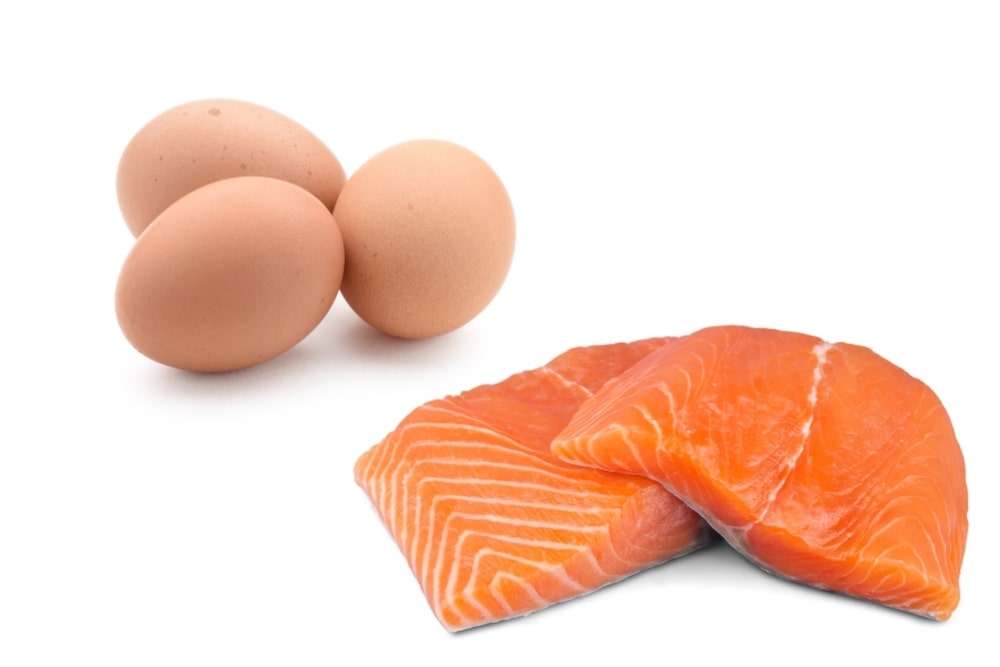
We’ll talk about salmon first, if you’re into it, that is, it can be a great option for keeping up with a nutrient-dense diet during pregnancy. Salmon contains omega-3 fatty acids which take care of your brain and your baby’s brain too.
Salmon can be prepared in a variety of ways just the way chicken or tofu can be -slather it on toast with pesto or fry it in a pan for dinner with white rice. Salmon will help your body regulate a healthy immune system as well as a healthy heart.
Eggs, now who doesn’t like eggs? They’re filled with protein and keep you full for a really long time, plus you can throw cheese on top of them for added protein. Cheese introduces calcium to keep your bones and teeth strong as can be.
They seem to contain multiple vitamins that people really wouldn’t expect to be in an egg – protein, fat, minerals, and so many vitamins are inside a single egg.
Leafy greens, broccoli, and green beans are a must-have for a well-balanced diet during pregnancy
Kale, spinach, broccoli, and other leafy greens are truly powerful nutrient sources during pregnancy. Throw them into smoothies, on a homemade pizza, and even in dishes like lasagna.
Dark leafy greens contain a variety and wide array of vitamins; vitamin C, vitamin K, vitamin calcium, folate, and more.
The nice part about greens these days is that you can go to the store and grab a really tasty green juice that has apples and other fruit in it which makes it taste super sweet that it masks the taste of the leafy greens well.
Berries oh wonderful tart and sweet berries you are loved by us pregnant ladies
Berries are one of the most amazing foods that you can incorporate into your diet during pregnancy. Though they can be small, they sure pack a big punch of nutrients for pregnant ladies.
The cool part about berries is how amazing they taste, yet they don’t tend to spike the blood sugar because the glycemic value is really not that high in them – they should keep your blood glucose nice and stable during a time when it’s easier to have blood sugar problems.
Strawberries, blueberries, raspberries are some of the easiest to include in your diet. If you’re feeling a lot of nausea during pregnancy you should be able to get some berries down just fine.
Lean meats like chicken, lean beef, and pork can help
Iron is a vitamin the body must have to properly produce and regulate red blood cells. During pregnancy, you will be producing roughly 50% more red blood cells than pre-pregnancy.
Lean meats are a sufficient way to keep up with the newfound demands that your body has during pregnancy.
View in gallery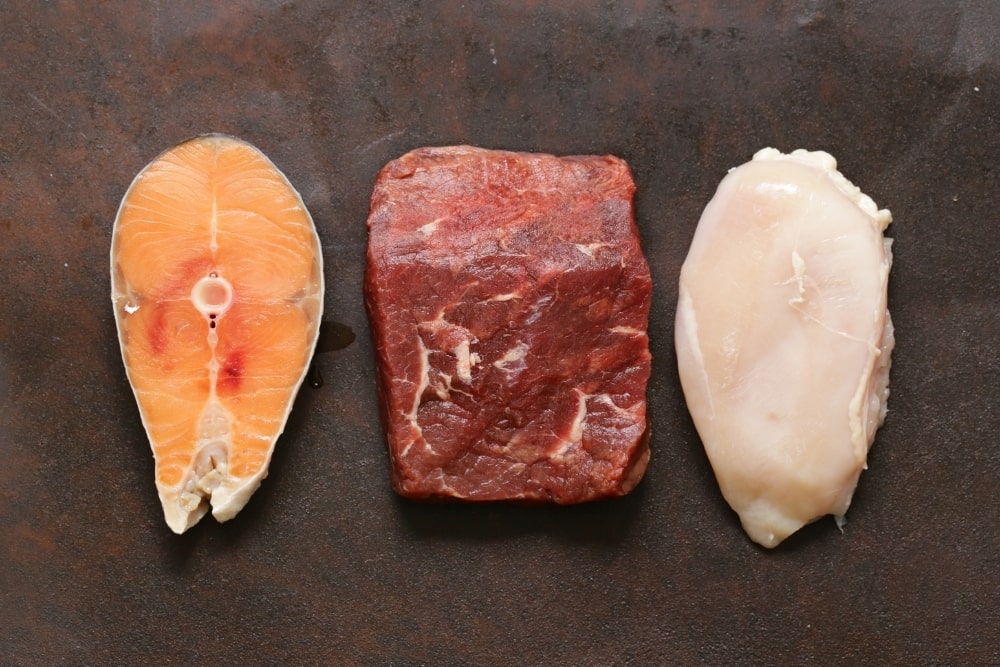
Lean pork, chicken, and beef can introduce necessary iron to your blood that will help your blood create hemoglobin – reducing your risk of anemia. In turn, the extra iron and protein you’ll gain from lean meats there will be a reduced risk for fetal low birth weight.
I understand well how hard it can be to continue eating enough meat throughout the duration of an entire pregnancy, especially if you suddenly don’t like it or if you have a meat-free diet but keeping lean meat in your diet as long as possible is best if you do eat meat regularly.
You can better absorb iron by eating certain foods high in vitamin C with lean meats, foods that are high in these vitamins are; bell peppers, oranges, tomatoes, and mandarin oranges.
Avocados are one form of fat you don’t have to ever feel guilty for indulging in
Maybe I’m just weird, but I can hear avocados calling my name from the kitchen countertop when I walk by. They just are too good to pass off, and the benefits you gain from eating avocados are beyond the goodness of good healthy foods can bring.
High in healthy fats, minerals, and surprisingly high in calories – avocados are a superfood for any mamma trying to grow her baby healthy.
Your baby and your body will thank you for avocado love, especially if you’ve been having morning sickness making it hard to get the calories in to sustain a nutrient-dense diet.
Make sure that you don’t skip brushing during pregnancy
Brushing can become understandably difficult for expectant mothers, feeling tired in the evenings, morning sickness, and having sore teeth and gums can be a lot to reckon with during pregnancy.
Despite the difficulties of brushing your teeth on a regular basis during pregnancy – it is vital to prevent toothaches.
Having a proper dental floss and brushing routine will help remove plaque, sugar, and gunk from the teeth that can cause toothache throughout the day. Sometimes if you feel a toothache coming on, brushing alone will take it away the same day.
Add a bit of baking soda to your toothpaste for a deeper clean
I’m sure we’ve all heard of adding a little bit of baking soda to our toothbrushes, but how many of us know the details behind the benefits of using it? Let’s talk about it right now.
Baking soda is basically salt with an altered compound called bicarbonate (highly beneficial). It has hundreds of uses and many people use it for at least one thing each week.
Baking soda helps teeth by removing built-up plaque, mild stains, and balancing the acids in your mouth.
View in gallery
If saliva becomes imbalanced, which it regularly can, there will possibly be an overgrowth of fungus, bacteria, or simply too much acidity. Baking soda rebalances the aforementioned.
Baking soda is even known to protect teeth as much as fluoride does if used correctly. When using baking soda, you must ensure that you don’t use it too often or too much in quantity in a given time.
Aim to add a pinch(around 2 tsp) of baking soda on top of your toothpaste around 3x a week for optimal effectiveness to prevent cavities during pregnancy.
Baking soda can be more harmful than it is helpful if used incorrectly. Don’t get carried away when you see the whitening results and use more than advised – doing so can abrade your enamel away because of the abrasive properties in baking soda.
Don’t forget the clove oil
Baking soda, vitamins, and bananas aren’t the only home remedy for toothaches during pregnancy – you can also utilize clove oil if your tooth is currently hurting. Cloves are nature’s form of Orajel, and most people already have them in the spice cupboard.
The most basic way to use cloves for a toothache is to apply a few drops of oil to the inflamed area, after a few minutes you should feel some relief. The other way to use cloves is to use the whole cloves by themselves or ground cloves as a paste.
To use whole cloves for toothache during pregnancy you will put one whole clove right on the tooth that is causing you pain – then hold it there.
Don’t try to chew them as they are very hard and that might hurt your tooth more. Hold the clove on your tooth for as long as needed for relief.
If you have clove in powdered form, you will need to make a paste out of the powder. To make a clove oil paste you will put a few tsp of clove powder in a bowl and add enough droplets of water to make a paste that will stay on the affected tooth long enough to relieve the pain.
You are welcome to add a bit of cayenne pepper to the mix if you’d like to for further benefits.
Attend dental appointments regularly during pregnancy
When you become pregnant, it’s even more important to attend dental appointments. This can be helpful in determining how pregnancy is affecting your gums, teeth, and mouth overall.
View in gallery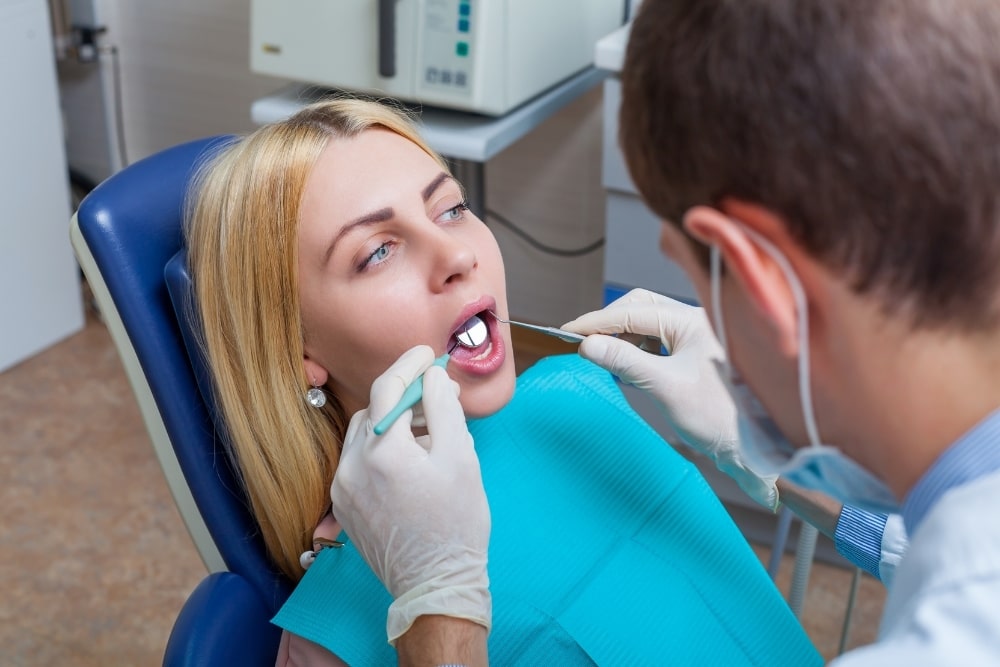
If your dentist ever sees any issues arising with your teeth during pregnancy, they can be caught and treated early enough so that they will not turn into cavities.
Your dentist can give you tips and recommendations on what protocols are best for optimal oral hygiene during pregnancy. Be sure to let your primary dentist know that you are pregnant as soon as you find out.
In Conclusion
As undesirable as toothaches are during pregnancy, they happen to a lot of mommy’s to be and they don’t have to be the end of the world.
The most important thing to keep in mind when you have a toothache is to take action sooner than later.
A toothache can last days and sometimes evolve into a cavity during pregnancy more easily due to the body’s hormonal shifts that affect saliva production, bacteria, and the acid within the mouth.
When you treat a toothache or a cavity right away during pregnancy, you won’t have to deal with the pain as long or the possibility of a cavity spreading to another tooth in the area.
Your dentist will likely give you priority during pregnancy for an appointment because of the nature that cavities pose during pregnancy.
Have your teeth looked at by a professional if they seem to have recurrent pain, or you see discoloration on any tooth, or if you feel a hole or any broken spots on your teeth when gliding your tongue over them?
Remember that being proactive toward your tooth health is going to help the most, regular brushing and flossing is a key ingredient to downplaying tooth pain while growing your baby for 9-months.
Sources
13 Foods to Eat When You’re Pregnant
5 Essential Vitamins for Teeth and Gum Health
11 Ways to Remineralize Your Teeth and Stop Demineralization






